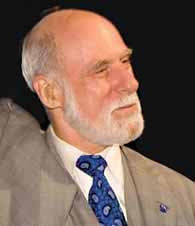|
Executive Interviews: Interview with Vinton G Cerf on Learning Organizations
July 2008
-
By Dr. Nagendra V Chowdary
 Vinton G Cerf
Vinton G Cerf Vinton G Cerf is Vice President Chief Internet Evangelist for Google. 
Many academicians and researchers
like Peter Senge in Fifth Discipline,
Marlene Fiol and Marjorie Lyles in
Organizational Learning, George P
Hubber in Organizational Learning:
The Contributing Processes and the
Literatures, Barbara Levitt and James
G March in Organizational Learning,
Chris Argyris in Double Loop Learning
in Organizations, Ray Stata in Organizational
Learning: The Key to
Management Innovation, and David
Garvin in Building a Learning Organization,
have defined what a learning
organization is. What according to
you are learning organizations? How
do you define them?
|
|
I am no expert but in my opinion organizations
show a variety of learning
characteristics including none. An organization
that does not learn is one
that ossifies and usually dies. But
some organizations learn by adding
new rules to deal with problems or
mistakes that have occurred in the
past. This leads to a kind of barnacleencrusted
ship of state that, perforce,
becomes increasingly tangled in its
own processes until it self-destructs.
-
What are learning organizations'
characteristics? Are there any good
examples for learning organizations?
A learning organization must be willing
to accept that it hasmademistakes
andmust correct them, rather than insisting
on rules that everyone has to
follow and exhibiting an unwillingness
to change them. Google is pretty
good at measuring itself and being
willing to change performance patterns
that lead to poor outcomes. -
What benefits can companies
expect to derive out of being learning
organizations? Why should organizations
aspire to be learning organizations?
The basic reason is to reach accommodation
between real world and the
ideal one embodied in some philosophical
setting. Learning organizations
can adapt but those that cannot
master new ways to work will fall
into rigid ways that could lead to corporate
decay. -
How do you define a successful
learning organization? What can be
the stylized facts from these successful
learning organizations? What is it
that these successful learning organizations
have that others do not have?
What are their unique and distinguishing
characteristics?
The executives are willing to learn
from mistakes and are open about it
with the employees. The employee
base feels empowered to comment on
the state of the company and to try out
new ideas and practices. -
All the successful learning organizations
seem to be Fortune 500 companies
(Southwest Airlines, Intel,
GE, WalMart, Cisco, P&G, Charles
Schwab, Disney, Dell Computer,
Goldman Sachs, Microsoft, Johnson
& Johnson, Toyota, Shell, etc) and
therefore it seems prohibitively expensive
and highly unlikely for
SMEs and startups to be learning organizations.
Do you agree with this?
No. I think small companies can also
learn to be effective learning leaders. -
Definitely, every company would
like to be a learning organization.
Success would not smile at them.
Why do you think many companies
fail in being learning organizations?
What are the impediments to being a
successful learning organization?
What can other companies learn from
these failed attempts? Do you agree
with the observation that productive
failure is better than an unproductive
success?
I don't know what unproductive success
is, so I don't have a response
there. However, I do believe that most
successful companies are able to learn
and adapt to changing conditions.
Corporate leadership that cannot
adapt to usually disables a company
in the long term. So leadership that
understands and encourages creative
adaptation is more likely to succeed
than corporate leadership that is unable
to accept that adaptation is important
to corporate survival and
growth.
1.
Learning Organization Case Study
2. ICMR
Case Collection
3.
Case Study Volumes
|
